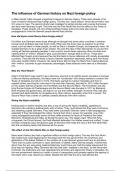The in uence of German history on Nazi foreign policy
In Mein Kampf, Hitler showed a signi cant interest in German history. Three main strands of his
view of history in uenced Nazi foreign policy. The rst was ‘racial history’ which drove Hitler’s very
rm views on race. The second strand was nostalgia for earlier empires and a sense that power
and land were Germany’s right. The third was the First World War and the e ect of the Treaty of
Versailles. These strands not only in uenced Nazi foreign policy but were also used as
propaganda to unite the German people behind Nazi policies.
How did Aryan racial theory drive foreign policy?
For Hitler, true Germans were Aryan although he thought that some other countries in northern
Europe such as Britain also had Aryan roots. Hitler saw the Aryan race as superior to all other
races, such as black or Asian people, as well as Slavs in Eastern Europe, and especially Jews. He
wanted Germany to be a great Aryan empire. He used the idea of Pan-Germanism to excuse this:
uniting all German-speaking peoples in one country would mean capturing other countries and
clearing them of ‘inferior’ people to give ‘pure Germans’ enough land to live on. These aims
a ected Nazi foreign policy because they led the Nazis to favour alliances with racially acceptable
countries. They also led the Nazis to favour German expansion eastwards, taking land from those
who were racially inferior. However, the racial theory did not stop the Nazis from making alliances
with ‘inferior’ countries to gain temporary advantages, these alliances were seen as a necessary
evil.
Why the Third Reich?
Hitler’s Third Reich was meant to be a Germany returned to its rightful power and place in Europe.
Unlike the Weimar politicians, the Nazis were not ‘revisionists’ who simply wanted to overturn the
Treaty of Versailles and return to 1914. The Nazis wanted to overturn Versailles and then to
expand further, securing far more land in the east than Germany had held in 1914. Hitler focused
on two earlier German empires: the First Reich and the Second Reich. The First Reich was the
Holy Roman Empire of Charlemagne and the Second Reich was founded in 1871 by Bismarck.
Both empires had gained land, and kept it, by war and military strength. However, they had also
worked hard diplomatically for acceptance by other nations, especially when rst in power. The
Second Reich had a series of carefully created alliances with other nations.
Giving the Nazis credibility
Harking back to earlier empires was also a way of giving the Nazis credibility, appealing to
Germans who wanted a political party with a history. They could stress that they were continuing
and restoring a great Germany. They used other successful German rulers in their propaganda,
especially if they had enlarged the nation. During their time in power, for example, one of the
many propaganda postcards shown at Nazi rallies showed the faces of Frederick the Great,
Bismarck, Hindenburg and Hitler, all facing the same way. The slogan read: ‘What the King
conquered, the Prince formed, the Field Marshall defended, the Soldier saved and uni ed.’ It was,
as Hitler constantly said, the glorious past of Germany that made the loss of the First World War
and the humiliating treaty that followed all the worse.
The e ect of the First World War on Nazi foreign policy
More recent history also had a signi cant e ect on Nazi foreign policy. The way the First World
War ended was a bad beginning for the peace and the new government: the overthrow and
abdication of the Kaiser Wilhelm II, the creation of a new German government and an armistice.
There was no public surrender or open admission of defeat. Many German people, misinformed
about how the war was going, believed Germany could have won had the kaiser stayed and the
army kept on ghting. Many Germans felt they had been ‘stabbed in the back’ by the November
Criminals, the politicians who had negotiated the armistice and signed the Treaty of Versailles. So
the new government started out under a cloud of unpopularity and protests against the signing of
the treaty which was viewed as a diktat. Despite the fact that the army had advised the
fiff
ff fl fi fl fiflfi ff fi ff fi fi




